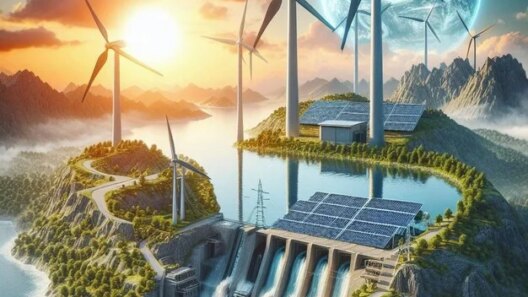Energy conservation in India is paramount. As the country grapples with burgeoning power demands, innovative solutions are emerging to tackle the ever-present challenges of energy efficiency and sustainability. The nexus between energy utilization and environmental protection has never been more critical, making this a pivotal moment for the nation’s green journey.
In a country where rapid urbanization and industrial expansion boost electricity consumption, understanding how to conserve energy effectively is essential. The ramifications of energy depletion are widespread, affecting economic stability, environmental integrity, and societal well-being. India’s energy landscape is characterized by a dependence on fossil fuels, which exacerbates carbon emissions and global warming. However, there exists a promise—a shift in perspective that revolves around innovation and the implementation of sustainable practices.
First, it is crucial to recognize and harness the potential of renewable energy sources. India is endowed with abundant sunlight, wind, and biomass resources. Embracing solar energy through photovoltaic panels and solar thermal technology offers a significant opportunity to reduce reliance on fossil fuels. The ‘Solar for All’ initiative is a testament to this commitment, aiming to ensure access to solar energy for every household. Distributed solar systems not only decentralize power generation but also empower communities to engage in energy production.
Moreover, wind energy holds substantial promise, particularly in coastal regions and open plains. With advanced turbine technology, harnessing wind power can significantly mitigate the additional strain on thermal power plants. Collectively, these renewable sources contribute to a diversified energy portfolio that can enhance energy security and combat climate change.
Transitioning to smart grid technologies is another innovation that can pave the way for profound energy savings. Smart grids integrate digital technology with traditional power networks, enabling real-time monitoring and management of energy distribution. This evolution minimizes energy losses during transmission and optimizes supply based on actual demand. By employing data analytics, utility providers can forecast consumption patterns, allowing for efficient load balancing and increased grid resilience.
Building energy efficiency is paramount in the quest to conserve power. Retrofitting and upgrading existing buildings with energy-efficient appliances, LED lighting, and improved insulation can drastically reduce energy consumption. The Bureau of Energy Efficiency’s initiatives encourage various sectors—from commercial to residential—to adopt energy-efficient standards and practices. Furthermore, employing green building certification systems, such as LEED, can guide architects and developers toward sustainable designs that conserve energy effectively.
Electric vehicles (EVs) represent a transformative innovation in the transportation sector, promoting energy conservation on an unprecedented scale. As urban centers swell, traditional fossil fuel-powered vehicles contribute substantially to air pollution and greenhouse gas emissions. EV adoption not only addresses these issues but also lessens the demand for electrical power from coal-fired plants. Incentives for EV manufacturing and ownership will stimulate economic growth while fostering a cleaner environment. Establishing robust charging infrastructure across urban and rural landscapes is crucial for promoting widespread adoption.
Energy conservation education plays a vital role in nurturing a culture of sustainability. Initiatives aimed at raising awareness about energy-saving practices can engage individuals and communities alike. Simple measures—such as turning off unnecessary lights, utilizing natural light, and unplugging idle appliances—can lead to significant energy savings over time. Education campaigns in schools, workplaces, and communities can inspire citizens to take part in this vital endeavour.
Moreover, corporate social responsibility (CSR) initiatives can facilitate energy conservation in businesses. Industries can adopt energy management systems that prioritize efficiency and sustainability. By committing to a reduction in their carbon footprint, companies can not only comply with regulatory standards but can also enhance their reputability and consumer appeal. This symbiotic relationship between corporate growth and environmental stewardship underscores the importance of innovation in energy conservation.
Investment in research and development is pivotal to unlocking new energy-saving technologies. The government and private sector must collaborate to fund innovative startups specializing in energy efficiency solutions. Breakthroughs in energy storage technology, such as advanced battery systems, can revolutionize power usage, allowing for better management of intermittent energy sources like solar and wind. This innovation enables consumers to rely less on traditional grid supplies and promotes energy independence.
Some argue that energy conservation is inherently connected to socioeconomic status. In a country where energy poverty is still a pressing issue, promoting energy access alongside conservation is vital. Innovations such as decentralized energy systems can empower rural communities to generate and consume their energy, reducing reliance on centralized fossil-fuel-based systems. Microgrid systems, using a blend of renewable energies, can ensure resilience and reliability even in remote areas.
In conclusion, the path to conserving energy in India is intertwined with groundbreaking innovation and an unwavering commitment to sustainability. Each individual, community, and corporation has a crucial role to play in reshaping how energy is consumed and conserved. By transitioning to renewable energy, adopting smart technologies, and fostering a culture of energy efficiency, India stands at the precipice of a sustainable energy future. As the planet faces unprecedented ecological challenges, the time to act is now. Every step taken toward energy conservation not only addresses power challenges but also safeguards the environment for future generations. The future is indeed bright when we embrace innovation and cultivate a holistic approach toward energy consumption.








